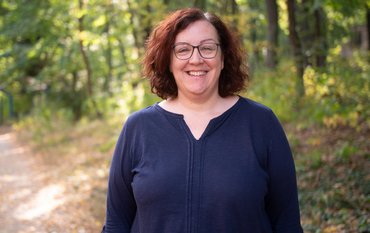Frank Zwaan and Benjamin Schwarz have received the grants of this year's GFZ Discovery Fund and will start their research work on 1 March 2022.
Benjamin Schwarz project will focus on physics-informed deep learning for fibre-optic distributed acoustic measurements. This new measurement technique promises unprecedented resolution but ammasses extremely large and complex datasets. By drawing on recent advances in scientific machine learning the goal of his GFZ Discovery Fund Fellowship project is to arrive at a physically consistent but efficient processing and simulation framework that will enable new discoveries and improved process understanding based on these novel observations. The research project will be conducted in Section 2.2 - 'Geophysical Imaging of the Subsurface' and it is implemented jointly with Sections 4.2 - 'Geomechanics and Scientific Drilling' and 4.5 - 'Sedimentary Basin Modelling'.
Schwarz earned his PhD from the University of Hamburg, where he already worked on unifying seismic subsurface imaging approaches based on physical principles. At the University of Oxford, he conducted research at the interface of controlled-source and earthquake seismology and developed novel approaches for seismic and radar-based geophysical imaging.
Frank Zwaan, who is coming to the GFZ from the Institute of Geology at the University of Bern, will focus his project on modelling mantle exhumation during rift and basin inversions and the implications for the exploration of natural hydrogen. Basin inversions are a common phenomenon worldwide. The inversion, i.e. reactivation, of normal fault systems within a basin, for example, has a significant impact on its final structure and alters reservoirs and fluid paths.
Frank Zwaan's project goal as part of the GFZ Discovery Fund Fellowship is two-fold:First, to apply lithospheric-scale numerical models to unravel how plate tectonic processes can exhume mantle material, and secondly assessing the potential for hydrogen generation from such exhumed mantle material, which represents a promising but so far largely overlooked source of green energy. Frank Zwaan will conduct research in GFZ Section 2.5 - Geodynamic Modelling and will closely collaborate with GFZ Sections 4.1 - Lithosphere Dynamics and 4.8 - Geoenergy, among others.
After studying geology and tectonics, Frank Zwaan did his doctoral thesis at the University of Bern on analogue modelling of continental rift tectonics. He subsequently launched a multidisciplinary research project on continental rifting in Ethiopia at the University of Florence, before returning to Bern for a project on analogue modelling of lithosheric-scale rifting processes.
The Fellowships of the GFZ Discovery Fund run for up to three years and support particularly innovative projects that identify future research fields within the GFZ research groups. The research topic can be chosen freely, but must be assigned to one of the GFZ's research groups in the fourth funding period of the Helmholtz Association's programme-oriented funding POF IV, as well as being interdisciplinary in nature and carried out in close cooperation with at least two GFZ sections.










![[Translate to English:] [Translate to English:] Abror Gafurov von dem Schriftzug "Welcome to Azerbaijan" und den UN und COP Logos](/fileadmin/_processed_/2/5/csm_2024_11_Baku_COP29_Abror_Gafurov_1042faec82.jpeg)


![[Translate to English:] Martin Herold standing in front of the library on the Telegrafenberg](/fileadmin/_processed_/c/d/csm_Martin_Herold_d385ee4dd9.jpeg)
![[Translate to English:] Many people are listening to a presentation in the GFZ lecture hall.](/fileadmin/_processed_/c/a/csm_1_Bild1_hell_b9c0e9f5ed.jpeg)






![[Translate to English:] Both scientists sitting on stools in front of a wall of books in the Telegrafenberg library](/fileadmin/_processed_/6/6/csm_Buiter_Castell_DORA_4_e87cb1ea18.jpeg)
![[Translate to English:] Gruppenbild mit 4 Personen](/fileadmin/_processed_/8/d/csm_20241017_GFZ-Emmerman-Medal-005_web_reinhardtundsommer_21a414fa4a.jpeg)






![[Translate to English:] Ice landscape with five red tents](/fileadmin/_processed_/8/9/csm_Zeltlager_auf_dem_Eis_Urheberin_Jenine_McCutcheon_5ced2d523b.jpeg)


